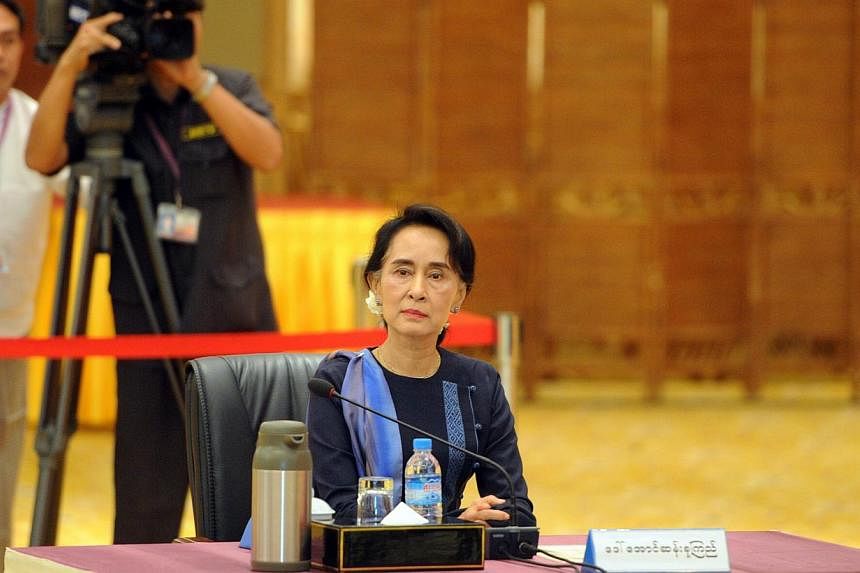Myanmar's unlikely capital, built less than 10 years ago out of scrub jungle by a military regime, will see a gathering of powerful world leaders this week at the Association of South-east Asian Nations (Asean) summit and related meetings.
Among them will be US President Barack Obama. When he last visited in November 2012 and spoke at the long-shuttered Rangoon University, signalling the country's coming out party, the mood was almost euphoric.
Mr Obama's visit then was an endorsement of Myanmar's carefully graduated power shift from four decades of military dictatorship to a quasi civilian government. It was also a foreign policy success for the US president who arrived in Yangon only days after winning a second term at home.
Two years later, the euphoria on both sides has been somewhat deflated - to optimism tempered with caution as Myanmar heads into an election year that will inevitably be laced with intrigue and potentially, turmoil.
Opposition leader Aung San Suu Kyi complained last week that reforms in Myanmar were backsliding, as she faced the reality that a change to the constitution to allow her to become president if her party wins the end-2015 election may be remote.
Rights and pro-democracy lobby groups list a range of issues - including the dismal and volatile situation in Rakhine state, a seeming rollback of media freedom and the halting progress of a complex peace process with close to 20 armed ethnic groups - that call into question the political commitment of the government that faces its first acid test in the election.
They are clamouring for more pressure on Myanmar's government on issues like human rights and Rakhine state, where over 100,000 minority Rohingya, victims of sectarian violence, still live in squalid camps, and many hundreds flee the country every day.
But President Thein Sein is beset by powerful competing forces and international opinion that remains fixated on the bad news and the role of Aung San Suu Kyi.
Domestic problems also weigh heavily on President Obama as his Democratic Party lost control of the US Senate last week.
With just two years of the Obama presidency left, analysts expect increased gridlock in Washington. And ironically, while Myanmar rings with clamours for more democracy, Mr Obama faces a public that has grown cynical about the genuineness and effectiveness of America's democracy.
But Myanmar's political transition, if somewhat shaky, remains a foreign policy success and the US is unlikely to yank the welcome mat from under President Sein Thein.
While that risks losing favour with Ms Suu Kyi, it recognises the reality of Myanmar's fractious, volatile and sometimes ugly politics and the inherent fragility of the transition with the military watching from the wings.
What transpires in Myanmar has strategic implications for the entire region.
For decades, as conflict and miserable conditions in Myanmar drove refugees across the border into Thailand, Beijing was among Myanmar's small handful of allies.
Now, Naypyitaw can claim support from New Delhi, Tokyo and Washington. Mr Obama will meet Ms Suu Kyi in Yangon on Nov 14. Indian Prime Minister Narendra Modi will also meet her.
Chinese Premier Li Keqiang, however, will not meet the opposition leader, reportedly because of "time restrictions.''
In his meetings with President Thein Sein and Ms Suu Kyi, Mr Obama is expected to discuss issues of concern - Rakhine state, the constitution and the election among them - in broad terms.
And he is expected to continue to support President Thein Sein to stay on track.
It is Myanmar's domestic politics which will decide the track.
Ms Suu Kyi seemed unimpressed after a much-analysed meeting on Oct 31, called by President Thein Sein in the interest of a "culture of dialogue''. The meeting included not only the opposition leader but also the powerful chief of the armed forces and speaker of Parliament - both of whom are potential candidates for the presidency.
Five days later, Ms Suu Kyi told reporters that the US had been "overly optimistic'' about the reform process in Myanmar.
"If they really study the situation in this country they would know that this reform process started stalling early last year'' she said.
But opinions differ. A pro-reform Myanmar analyst wrote in an email to The Straits Times: "Since 2012, I have seen progress every single day.
"One has to read the newspaper carefully every day. There are hundreds of small stories that indicate that this country is changing and reforms are not backsliding," said the analyst with high-level connections who asked not to be named.
"I think it is more of an expectations problem. After more than 50 years of neglect, abuses and mismanagement, the people want to see more. But the government's attempt to reform has been hampered by the legacies of the recent past. The government cannot meet the expectation of the general population.''
Amid the din of multiple stakeholders given a voice after decades of stifling military rule, a senior reformist government figure said in a candid conversation with The Straits Times that in Myanmar's context, the reality was "you can't go from zero to 100 per cent democracy suddenly.''
From Asean's point of view, the group's long-standing policy of engagement with the erstwhile military regime paid off with the transition. The Naypyitaw summits are an opportunity for Asean to show that Myanmar's reforms are working. Any backsliding on the foreign policy front risks disturbing the balance.
The country is in a fragile equilibrium among its establishment elites and political power brokers. The military remains on watch as the latest experiment with democracy evolves.
Many analysts echo reformist government insiders as saying that the key to keeping it in the barracks is a calibrated transition.
For Myanmar to stay on track, Mr Obama has little choice but to support the reformists.

